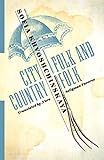City Folk and Country Folk / Sofia Khvoshchinskaya.
Material type: TextSeries: Russian LibraryPublisher: New York, NY : Columbia University Press, [2017]Copyright date: ©2017Description: 1 online resource (192 p.)Content type:
TextSeries: Russian LibraryPublisher: New York, NY : Columbia University Press, [2017]Copyright date: ©2017Description: 1 online resource (192 p.)Content type: - 9780231183024
- 9780231544504
- 891.73/3
- PG3447.V47
- online - DeGruyter
| Item type | Current library | Call number | URL | Status | Notes | Barcode | |
|---|---|---|---|---|---|---|---|
 eBook
eBook
|
Biblioteca "Angelicum" Pont. Univ. S.Tommaso d'Aquino Nuvola online | online - DeGruyter (Browse shelf(Opens below)) | Online access | Not for loan (Accesso limitato) | Accesso per gli utenti autorizzati / Access for authorized users | (dgr)9780231544504 |
Frontmatter -- CONTENTS -- Acknowledgments -- Introduction -- Notes on the Translation -- Part I. City Folk and Country Folk -- 1 -- 2 -- 3 -- 4 -- 5 -- 6 -- 7 -- 8 -- 9 -- 10 -- PART II. City Folk and Country Folk -- 11 -- 12 -- 13 -- 14 -- 15 -- 16 -- 17 -- 18 -- 19
restricted access online access with authorization star
http://purl.org/coar/access_right/c_16ec
An unsung gem of nineteenth-century Russian literature, City Folk and Country Folk is a seemingly gentle yet devastating satire of Russia's aristocratic and pseudo-intellectual elites in the 1860s. Translated into English for the first time, the novel weaves an engaging tale of manipulation, infatuation, and female assertiveness that takes place one year after the liberation of the empire's serfs.Upending Russian literary clichés of female passivity and rural gentry benightedness, Sofia Khvoshchinskaya centers her story on a common-sense, hardworking noblewoman and her self-assured daughter living on their small rural estate. The antithesis of the thoughtful, intellectual, and self-denying young heroines created by Khvoshchinskaya's male peers, especially Ivan Turgenev, seventeen-year-old Olenka ultimately helps her mother overcome a sense of duty to her "betters" and leads the two to triumph over the urbanites' financial, amorous, and matrimonial machinations.Sofia Khvoshchinskaya and her writer sisters closely mirror Britain's Brontës, yet Khvoshchinskaya's work contains more of Jane Austen's wit and social repartee, as well as an intellectual engagement reminiscent of Elizabeth Gaskell's condition-of-England novels. Written by a woman under a male pseudonym, this brilliant and entertaining exploration of gender dynamics on a post-emancipation Russian estate offers a fresh and necessary point of comparison with the better-known classics of nineteenth-century world literature.
Mode of access: Internet via World Wide Web.
In English.
Description based on online resource; title from PDF title page (publisher's Web site, viewed 25. Jun 2024)


